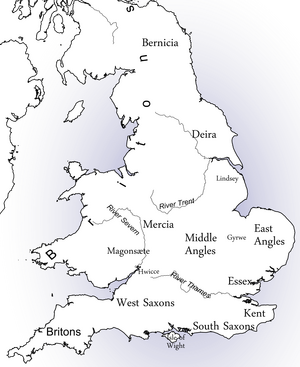Bernicia
| Author:Laxman Burdak, IFS (R) |

Bernicia (Old English: Bernice, Bryneich, Beornice; Latin: Bernicia) was an Anglo-Saxon kingdom established by Anglian settlers of the 6th century in what is now southeastern Scotland and North East England.
Jat clans
History
The Anglian territory of Bernicia was approximately equivalent to the modern English counties of Northumberland, Tyne and Wear, and Durham, as well as the Scottish counties of Berwickshire and East Lothian, stretching from the Forth to the Tees. In the early 7th century, it merged with its southern neighbour, Deira, to form the kingdom of Northumbria, and its borders subsequently expanded considerably.
Bernicia occurs in Old Welsh poetry as Bryneich or Brynaich and in the 9th-century Historia Brittonum, (§ 61) as Berneich or Birneich. This was most likely the name of the native Brittonic kingdom, whose name was then adopted by the Anglian settlers who rendered it in Old English as Bernice or Beornice. The counter hypothesis suggesting these names represent a Brythonic adaption of an earlier English form is considered less probable.
Local linguistic evidence suggests continued political activity in the area before the arrival of the Angles. Important Anglian centres in Bernicia bear names of British origin, or are known by British names elsewhere: Bamburgh is called Din Guaire in the Historia Brittonum; Dunbar (where Saint Wilfrid was once imprisoned) represents Dinbaer; and the name of Coldingham is given by Bede as Coludi urbs ("town of Colud"), where Colud seems to represent the British form, possibly for the hill-fort of St Abb's Head.[1]
Analysis of a potential derivation has not produced a consensus. The most commonly cited etymology gives the meaning as "Land of the Mountain Passes" or "Land of the Gaps" (tentatively proposed by Kenneth H. Jackson).[2] An earlier derivation from the tribal name of the Brigantes has been dismissed as linguistically unsound.[3] In 1997 John T. Koch suggested the conflation of a probable primary form *Bernech with the native form *Brïγent for the old civitas Brigantum as a result of Anglian expansion in that territory during the 7th century.[4]
External links
References
- ↑ Rollason, Northumbria 500–1100, p. 81.
- ↑ Jackson, Language and History in Early Britain, pp. 701–5; Rollason, Northumbria 500–1100, p. 81.
- ↑ Jackson, Language and History in Early Britain, pp. 701–5; Jackson, The Gododdin, p. 81.
- ↑ Note 566 in John T. Koch, ed. (1997). The Gododdin of Aneirin: text and context from Dark-Age North Britain. University of Wales Press. p. 216. ISBN 978-0-7083-1374-9.

